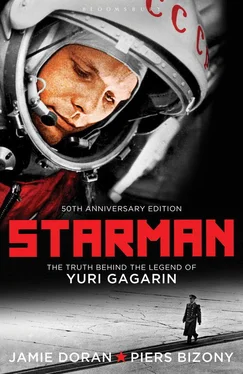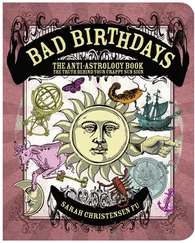In the poor weather, and with no warnings from ground controllers, the crew of the other jet may not even have been aware of the near-miss. But some retired Sukhoi SU-11 veteran out there may well be keeping his head down today.
Gagarin’s death was shameful not just because of the loss of a national hero in muddled circumstances, but because of the dangerous flaws revealed in the Soviet military technology of his time. Obviously their radar systems were not capable of simultaneous mapping of aircraft heights and positions, nor of positively identifying one target from another. The implications of this were highly alarming. In theory, a foreign jet simulating approximately the usual routines and flight patterns of Soviet aircraft could have flown close to an airbase, or some other military target, without clearly being identified as a potential enemy. In all likelihood Gary Power’s U-2 spy craft, shot down in May 1960, was identified as hostile only because its flight path was noticeably different from the expected routes of other Soviet aircraft that day.
There have always been rumours that Yuri Gagarin was murdered by Leonid Brezhnev’s administration. Journalists, friends and relatives still talk of dark plots, although their anger is more metaphorical than literal. There is no real evidence to suggest that Gagarin’s crash was anything other than an accident. Incompetence and poor administration at many levels certainly contributed to his death, but deliberate malice seems unlikely. The real crime, at least as far as Gagarin’s family was concerned, was that the authorities told them so little of the truth. ‘My parents weren’t sure what to believe,’ says Valentin. ‘We thought Yura’s death was ordered by Brezhnev. When Yura was at official visits with him, nobody paid any attention to Brezhnev, and he hated it when people didn’t listen to him. Brezhnev wanted people to pay attention to him, and nobody else… There are no accidents in life, only causes that lead to accidents. I don’t believe in coincidences, either. It was a set-up, right to the last minute.’
The last time Valentin saw his brother was on February 25, 1968, a few days after Yuri had received his diploma. Some journalists spoiled the mood that evening when they arrived, uninvited, at Gagarin’s Moscow apartment. ‘They rang the bell, I opened the door a little bit, and they pushed their way in,’ says Valentin. ‘What the hell could I do? Yura said they were parasites, and he couldn’t even relax at home. They started to take pictures, and one correspondent noticed Yura’s new Japanese camera, and said, “I will give you my camera, you give me yours, and I’ll pay the difference.” Yura turned to Valya and said, ‘Let’s give him the money instead, so he won’t ask that question again.” The journalist was very ashamed after that.’
Gagarin’s sister Zoya also tells a bitter story. ‘The last time we saw Yura was at his graduation on February 18, where he received his diploma papers from the Zhukovsky Academy, along with Gherman Stepanovich Titov. Yura was very happy to receive the diploma after so much hard work. After that, we only heard about his death five weeks later on the radio. We weren’t given any advice, we weren’t warned in advance. We weren’t told anything at all. I felt very sick, and so did Mamma. The doctors had to give us endless injections to calm us down… There was never any precise official information about the cause of Yura’s death, just guesses and rumours, all the worst things you could posibly think of. Someone helped him to die, that’s my feeling.’
Zoya recalls the funeral arrangements with a grimace of discomfort. ‘We sat for two days in the House of the Soviet Army, and the endless funeral music banged away in our heads. We thought we’d go insane. People were walking, walking, walking through to say goodbye. They came from everywhere, an endless procession of them. There were such long queues, the guards had to block the entrance for a while. It was terrible.’
As was the custom, Gagarin’s mother wanted to see her son for one last time before committing his body to the crematorium’s flames. Valentin describes the worst moment. ‘We wanted to open the coffin, but the head of the funeral team wouldn’t allow it. Mamma and Zoya started to argue with him, and everybody was shouting. Finally he let them do whatever they wanted. They pulled off the red velvet drape and opened the coffin, and inside there were human remains in a plastic bag. It was just about possible to recognize some of them. Yura’s nose was in place, but his cheek was torn off. Somebody told me later that Serugin in his coffin looked just as bad. Well, we looked, and then we closed the coffin. The music started to play, and the coffin moved slowly into the furnace. The next day, at the official funeral, Yura’s ashes were put into the Kremlin wall. And that was it.’
Zoya says that her mother Anna took her son’s death very hard, and a peculiar cruelty of history prevented her from finding any peace. ‘Usually people have a chance to bury their loved ones, and then they calm down as time passes, but every day Mamma was reminded of it, because Yura was so famous. People were always turning up from all over the Soviet Union to pay their respects and see our family home. Mamma lived until she was eighty, and I often wonder how she got through it. She suffered more than the rest of us, I’m sure.’
Many of Gagarin’s friends and colleagues visited his parents in Gzhatsk to express their sympathy. Sergei Belotserkovsky recalls, ‘During my last meeting with Gagarin’s mother, when we were alone, she asked me all of a sudden, “Was Yura killed?” I was stunned. “What makes you think so?” I asked, and she said that Yuri had told her once, “Mother, I’m very afraid.” She said she hadn’t understood what he’d meant by that, but it troubled her.’
Belotserkovsky offers his own interpretation. ‘I don’t think Gagarin feared for his life. It was a different kind of fear – the fear we all shared in those days, our fear of society, and of the world in which we lived. Letters – dreadful letters – were pouring into Gagarin’s office. All the distresses and problems in society impinged on him. He carried an immense load on his shoulders… One could sense his anxiety and tension. He was an emotional person, and he felt upset when he couldn’t help… He didn’t fit into the lifestyle of the Party élite and the higher levels in the Brezhnev system. He was alien to them, so they rejected him. There were attempts to tame him, to buy him off, but he wouldn’t succumb. He was too honest, too self-willed and independent.’
Belotserkovsky, Leonov, Titov and others were welcome at the family house, but other less familiar visitors inadvertently added to the family’s emotional turmoil. From the moment of Gagarin’s space flight in 1961 to his death in 1968, his father Alexei and younger brother Boris were approached almost every day by people wanting them to pass on their requests to the First Cosmonaut; or by people simply seeking the thrill of meeting any available members of this famous family. After Gagarin’s death, the strangers still came; and over time both Alexei and Boris became inadvertent alcoholics, because they could not politely refuse the many drinks offered to them. This pressure to entertain visitors and accept their well-meant gifts of vodka and brandy had fatal repercussions: in 1976 Boris hanged himself, almost as if he were allowing Albert to complete his sadistic wartime work, while Alexei’s weak health rapidly deteriorated.
Gagarin’s wife Valentina successfully raised their two fine daughters, who now enjoy rewarding lives. Valentina still lives within the perimeter of Star City, in a very modest house, and almost never speaks to journalists. Many space veterans regard her humble accommodation as a national disgrace, but she prefers not to draw attention to herself. Golovanov points out, ‘She changed very little, despite the lavish attention paid to her by Nikita Khrushchev, who awarded her the Order of Lenin after Gagarin’s space flight. Never in her life did she wear it, or any of the awards and medals given to her… She was an honest person inside, and so was Gagarin. Despite his fame, he never forgot that he was at the top of a huge pyramid of engineers and constructors who prepared him for his flight.’
Читать дальше












